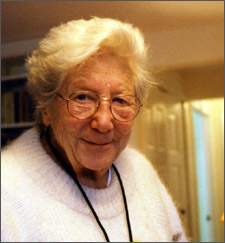 | Florence Wald
photo by John Biewen | |
A Revolution in Dying
part 1 2 3 4 5 6 7 8

Florence Wald
Starting in the late 1950s, Cicely Saunders wrote articles in medical journals and talked about her ideas for end-of-life care with whoever would listen on either side of the Atlantic.
One of the first Americans to respond was a Connecticut nurse named Florence Wald.
She walks the gleaming halls of the Yale New Haven Hospital with Bernard Lytton, a urologist and professor emeritus. Wald used to be five-foot-two, but now in her mid-80s, she's down to an even five feet.
Lytton leads us into the Fitkin Amphitheater, one of those circular, plunging, medical school lecture halls. "In 1963, I think, Cicely came here and gave her first talk on hospice care," Lytton says proudly. Lytton had met Saunders in London. He was instrumental in getting her invited to Yale.
Florence Wald was Yale's Dean of Nursing at the time. When she heard about the talk Saunders gave at the medical school, she invited the British visitor to repeat it for nursing students and faculty. "In 1963 we were struggling with patients, particularly the cancer patients, who were being treated with surgery and with radiation in the hospital," Wald recalls. "And despite the fact their condition was worsening, the curative treatment was pursued."
Wald listened, enthralled, as Saunders described her experimental work using drug cocktails and tender attention to keep dying cancer patients alert and comfortable. Saunders was already articulating principles that remain at the core of hospice care today: generous control of symptoms; attention to the patient's psychological and spiritual needs; care and support for the family as well as the patient.
"To us she was a nurse, and that was the epitome of nursing," Wald says. "So it was a very, very moving experience for me."
Wald was so inspired that within a couple of years, she resigned her deanship at Yale. She started working with a small group in New Haven toward founding the first hospice program in the United States. Connecticut Hospice would treat its first patients in 1974.
Next - In Tune with the Times
|

